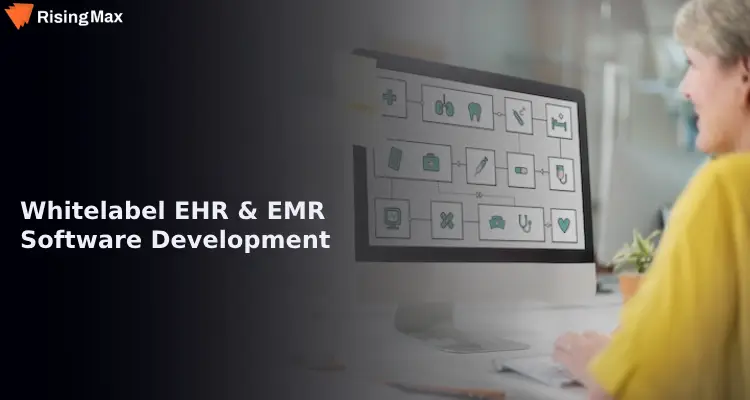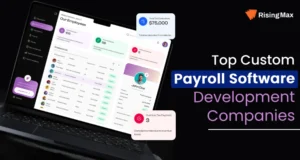Developing EMR/EHR software solutions enables you to digitize each aspect of connecting with patients. Though it might take time to build and launch such software in the market, leveraging ready-made EHR software to simplify the record of medical software is a blessing for hospitals, clinics, and doctors. It allows you to easily document medical data in customizable forms and read the patient’s diagnosis, history, treatments, and more under one portal.
Difference Between EHR and EMR
You might find the terms EHR (electronic health record) and EMR (electronic medical record) confusing. They need clarification.
According to the HITECH Act, an EHR is an electronic record of an individual’s health-related information created, gathered, and managed by authorized healthcare clinicians and staff.
On the other hand, EMR is a digital equivalent of a paper record at a doctor’s clinic. It comprises general patient information, including medical and treatment history, accumulated by individual medical practices.
The two are similar in developing software, as requirements for both can be inoculated in one platform. EMRs are helpful for diagnosis and treatment by a single provider. Individual practices use EMRs, which are not shareable between organizations.
In contrast, EHRs conceptualize sharing patient information with authorized staff and providers from multiple organizations. The software allows practitioners to exchange a patient’s medical information between imaging facilities, specialists, labs, pharmacies, emergency rooms, and across state lines.
Get ready to step ahead in the medical sector with whitelabel EMR/EHR software
that eases your workflow at your fingertips! Get in touch with RisingMax experts and witness the fruitful outcomes coming your way.
How Does a Readymade EHR/EMR Systems Improve Your Working Systems?
Healthcare professionals must understand patient histories and maintain effective, ongoing communication with patients about their treatment and health plans. It is essential to support this and automate your working system to encourage providing the best care possible.
This is where our EHR/EMR software comes into the picture. This software permits providers to use templates that capture relevant information during patient encounters and to recall this information as required. Interoperability among medical information systems has become common. Patients’ records are more accessible throughout the care cohesion.
For instance, accessing a patient’s medical history can dramatically enhance the care quality they receive during a visit to the emergency room when time is of the essence. Modern EHRs help medical practitioners lower mistakes, especially during medication prescriptions.
Features of Our Whitelabel EMR Software System
Irrefutably, EMR and EHR have transformed the healthcare software sector by digitizing patient information and facilitating medical procedures. While similar, these two systems have distinct features tailored to meet specific requirements within the healthcare system.
The system typically includes the following features:
Patient History and Demographics: EMR/EHR software maintains thorough patient demographic records, including name, gender, age, contact details, and medical history. This information is the foundation for subsequent medical documentation, making it easy for doctors to remember multiple patient records.
Clinical Documentation: Determining each patient’s disorder requires a record. Clinicians efficiently record patient encounters, ensuring the accuracy of healthcare records with EMR/EHR systems. These systems streamline the development and management of clinical documentation, including treatment plans, progress notes, prescriptions, diagnoses, and test results.
AI-Enabled Telehealth: A safe, quick, and intelligent EHR/EMR solution that delivers care anytime, anywhere. We have integrated the software with AI/ML abilities to enhance effective communication and patient engagement. You can use voice dictation of clinical notes, personalized AI- Avatars, integration with wearables and seamless data sync, drag-and-drop calendars, and more.
Integration with Diagnostic Devices: Many EMR and EHR solutions integrate with diagnostic devices, such as imaging systems, laboratory equipment, and vital sign monitors. This flawless integration enables the automatic capture and storage of diagnostic data directly into patients’ records, diminishing manual data entry errors and boosting workflow efficiency.
E-Prescription Tools: EMR software includes e-prescribing capabilities, permitting medical providers to electronically send prescriptions to pharmacies. E-prescribing improves medication management, enhances prescription accuracy, and simplifies medication reconciliation.
Appointment Scheduling: Medical practitioners must attend all the day’s appointments. EMR/EHR systems feature appointment-scheduling functionalities, including rescheduling, scheduling, and cancellations. Integrated scheduling helps enhance clinic workflow, send appointment reminders to patients, and prevent patients from standing in a long queue or waiting for their turn.
Billing and Coding: EMR software facilitates billing and coding procedures by producing accurate billing codes according to documented services. This facet streamlines revenue cycle management and ensures compliance with medical regulations.
Patient Records: EHR software crystallizes diverse medical data, including medications, medical history, diagnoses, allergies, procedures, immunizations, and clinical notes, into a unified electronic record accessible to authorized users. This comprehensive view of patient health information exchange software helps doctors create informed decisions and monitor their healthcare working system.
Patient Portals: EHR portals allow patients to securely access their health records, schedule appointments, interact with healthcare providers, view educational resources online, and request prescription refills. Patient portals encourage patient engagement, self-management, and the empowerment of health.
Clinical Decision Support: EHR systems integrate clinical decision support tools, such as reminders, alerts, and evidence-based guidelines, to assist medical care providers in creating clinical decisions at the point of care. The more the clinical decision support is emphasized, the more the patient’s quality of care and adherence to best practices are enhanced.
Population Health Management: EHR software sustains population health management initiatives by evaluating aggregated patient data to recognize trends, opportunities, and risk factors for preventive care interventions. Population health tools allow healthcare organizations to enhance health outcomes, diminish healthcare costs, and boost resource allocation.
24/7 Access: Patient records can be accessed from any device or computer that opens up with EHR/EMR software. As security is vital at this level, we provide whitelabel electronic healthcare record software that always addresses your patients’ queries.
How Much Does It Cost Of Whitelabel EHR Software?
Set new perspectives for innovation and self-exploration. If you aim to integrate EHR/EMR software into your medical system.
Why Choose Readymade EHR Software for Your Medical Practices?
Selecting whitelabel EMR and EHR solutions for healthcare practices provides manifold benefits and significantly augments efficiency, overall practice management software, and patient care.
Deep dive into why healthcare practices must consider whitelabel EHR/EMR solutions.
Customization and Branding: Whitelabel EMR software permits healthcare practices to customize and promote the software according to their specific needs. This includes adding their colors, logo, and design elements, building a branded and cohesive experience for staff and patients. Customization makes software align hassle-free with the practice’s workflow preferences and exceptional identity.
Cost-Effectiveness: Building a custom EMR software solution from scratch may require time and money. Whitelabel solutions provide a cost-efficient alternative, delivering a pre-built foundation tailored to meet the practice’s requirements at a fraction of the cost of custom development. This cost-saving factor makes readymade EMR/EHR software accessible to many healthcare practices.
Scalability: Whitelabel EMR software needs to be scalable. This means the software can develop and adapt alongside the medical practice’s requirements. Whitelabel solutions accommodate varying levels of volume and complexity. This scalability ensures that EMR systems remain efficient as the practice advances.
Quality Assurance and Compliance: Reputable whitelabel EMR/EHR software providers adhere to unyielding quality assurance standards and regulatory needs, such as HIPAA compliance. By selecting a trusted whitelabel solution from us, healthcare practitioners can rest assured that their EMR/EHR systems meet industry standards, data integrity benchmarks, security, and privacy.
Technical Support and Training: Whitelabel EMR software developers offer technical support and training to assist with implementation, ongoing usage, and onboarding. This support runs from initial setup and configuration to troubleshooting issues and enhancing system performance. By partnering with a reliable whitelabel provider like RisingMax, healthcare practices access the assistance and expertise required to maximize the benefits of their EMR/EHR system.
Privacy: EHR/EMR combats fraud and secures doctors’ and patients’ data. The threat of data breaches is always present in apps. That is why our developers build encrypted platforms for secure transactions and communications.
What is the Cost of Whitelabel EMR Software?
Whitelabel solutions offer flexibility for customization and branding, permitting companies to tailor the software to their requirements. The whitelabel EMR/EHR software costs vary depending on the customization needs, features, ongoing support, and user licenses.
However, entry-level whitelabel EHR/EMR software might cost a few thousand dollars for smaller practices or clinics. Costs can reach tens or even hundreds of thousands of dollars annually for those needing extensive customization. It includes implementation expenses, licensing fees, ongoing support, and training.
Healthcare organizations must evaluate their requirements and budget constraints when choosing a whitelabel EHR/EMR solution. They must also consider interoperability, scalability, user experience, and regulatory compliance factors.
Wrapping Up!
Readymade EHR/EMR software has gained popularity in a captivating and fast-paced area. It offers a vast field of experiments to reshape the healthcare industry and reflect some traits of the human inner world.











